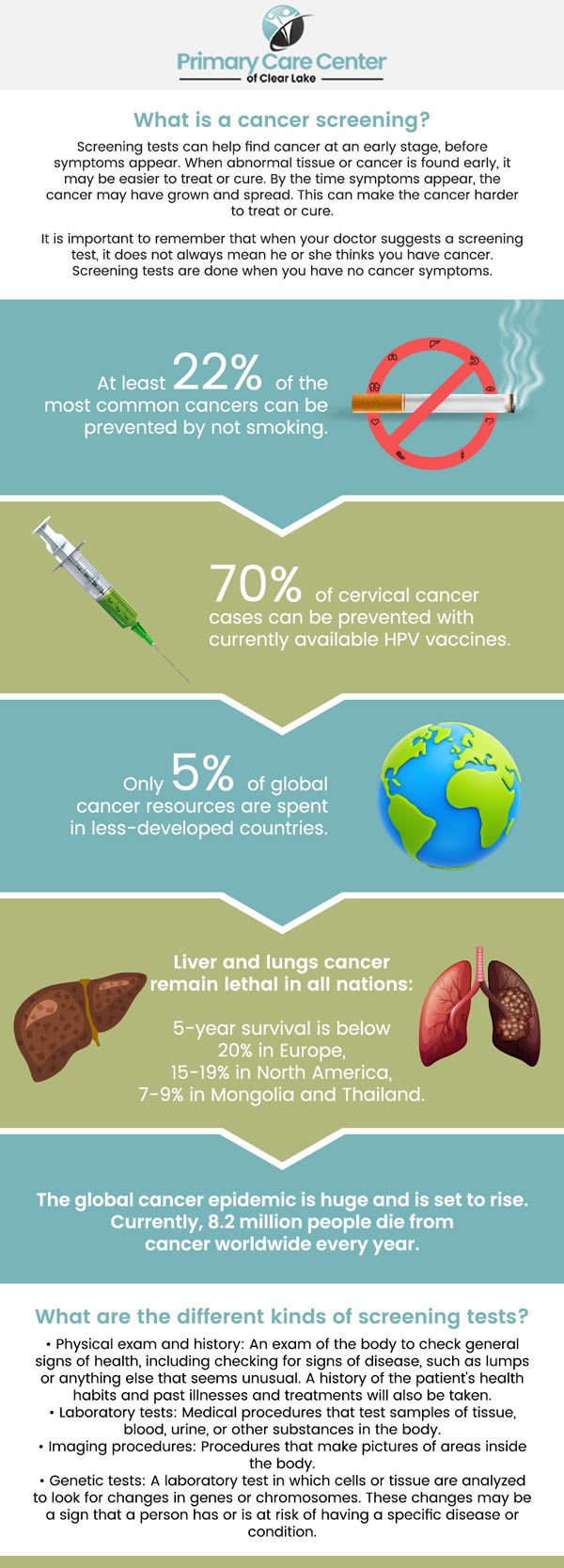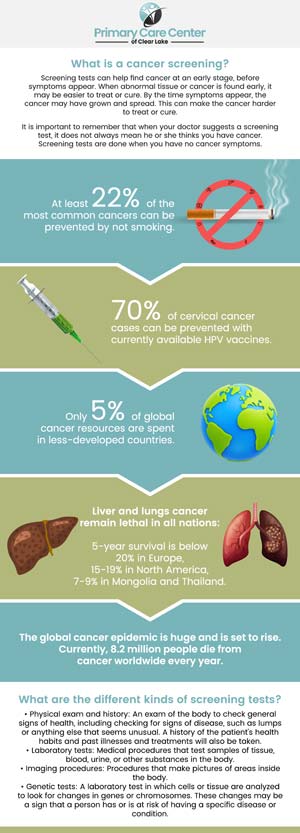Cancer Screening Clinic in Webster, TX
At Primary Care of Clear Lake, we understand the critical role of early detection in effectively managing cancer. Dr. Smriti Choudhary, MD and our team can guide you through the various screening options tailored to your specific risk factors. Recognizing the importance of timely and personalized screening can significantly impact outcomes. To discuss your screening needs and how we can support your health, contact us or book an appointment online today. We have convenient locations to serve you in Webster and Pasadena, TX.




Table of Contents:
What to expect during cancer screening?
How do I prepare for cancer screening?
How often should cancer screening be done?
How long does a cancer screening last?
At Primary Care of Clear Lake, we firmly believe in the importance of preventive healthcare, including cancer screening. This crucial medical approach helps us detect cancer in its early stages, making it more manageable and treatable.
Your journey with us begins by scheduling an appointment with one of our healthcare providers. During this appointment, we’ll review your medical and family history, lifestyle choices, and other possible risk factors to evaluate your cancer risk. Please feel free to share openly and honestly.
Before your screening, we may instruct you to fast for several hours, particularly if your screening involves specific medical equipment or contrast dyes. We also advise against taking blood-thinning medications as they may interfere with certain screenings. Please bring your comprehensive medical history, including information on past surgeries, diagnoses, and any family history of cancer.
We conduct a variety of screenings, depending on the type of cancer we are looking for. While these procedures might cause slight discomfort, they are typically quick and safe. If we find any suspicious areas during the screening, we may perform a biopsy, taking a small tissue sample for further examination in our lab.
Once we have your screening results, we will discuss them with you. If there are any abnormalities, we may need to conduct further tests. If there are no signs of cancer, we will advise you on when your next screening should be based on your risk factors.
The frequency of your cancer screenings will depend on several factors such as your age, gender, risk factors, and previous screening results. We will recommend a personalized screening schedule for you.
Regular screenings are essential for catching cancer at its most treatable stage. Following our advice on maintaining a healthy lifestyle can further reduce your risk of developing cancer.
Understanding the screening procedure and why it’s being done is crucial. Our medical team at Primary Care of Clear Lake will provide you with all the necessary information, alleviate any fears or anxiety you may have, and answer all your questions.
Before your screening appointment, gather your medical records, including past screenings, biopsies, and treatment records. We encourage you to provide these to your healthcare provider at our practice to facilitate a comprehensive assessment.
Depending on the type of cancer screening test, the healthcare professional at our practice may instruct you on specific preparations, like fasting or avoiding certain medications. You must follow these instructions to avoid any potential complications or inaccurate results. Remember to stay hydrated and choose loose, comfortable clothing for your appointment.
It’s also important to disclose any symptoms, medical conditions, or medications you are taking. This information helps us tailor the screening and interpret the results accurately.
After your screening, our team will provide instructions for follow-up care. Adhere to these instructions, including scheduling any necessary appointments for further evaluation or treatment.
Avoid alcohol intake in the hours leading up to the appointment also get proper sleep, and bring a support person or family member to accompany you.
Cancer screening plays a significant role, as it allows for early detection and increases the chances of successful treatment. The frequency of these screenings varies based on factors such as age, personal and family health history, and the specific type of cancer.
Mammograms:
We recommend breast cancer screening for women starting from the age of 40 to 44 and then annually or biennially for women aged 45 to 54. Women aged 55 and over can opt to have mammograms biennially or choose to maintain annual screenings if they wish.
Colorectal Cancer Screening:
Our practice advises both male and female patients to start colon and rectal cancer screening at age 45, with follow-up screenings every 5 to 10 years depending on the type of test used. Our preferred method is a colonoscopy every 10 years, but other options include flexible sigmoidoscopy every 5 years.
Cervical Cancer Screening:
We recommend that our female patients begin cervical cancer screenings at age 21, occurring every three years until they reach 29. Between the ages of 30 and 65, women should undergo a Pap test combined with an HPV test every five years, or opt for a Pap test alone every three years.
Prostate Cancer Screening:
Prostate cancer screening is a personal decision that we believe should be discussed with our healthcare professionals. Start at age 50, or age 45 for those at higher risk. We offer personalized screenings based on individual risk factors and preferences.
Lung Cancer Screening:
Individuals aged 50 to 80 with a history of smoking equivalent to 20 pack-years, who currently smoke or have quit in the last 15 years, are advised to undergo annual lung cancer screenings. We offer low-dose computed tomography (LDCT) for these screenings.
Other Screenings:
At Primary Care of Clear Lake, we also offer skin cancer screenings performed by our healthcare professionals, especially for those with increased risk factors. We also begin blood pressure and cholesterol screenings at age 20 and repeat them periodically.
The frequency of cancer screenings at our practice is influenced by several factors including age, family history of cancer, personal medical history, overall health status, and individual preferences. Our healthcare professionals are always available to consult with you to determine the most appropriate and individualized cancer screening schedule.
We understand that the duration of a cancer screening can vary depending on the type of test, the individual’s medical history, and their risk factors. For example, a mammogram, which is a routine screening for breast cancer that we offer, typically lasts about 15 to 30 minutes. Similarly, a Pap smear, used for cervical cancer screening, is often performed in about 10 to 20 minutes during a pelvic exam.
We also assist in arranging colonoscopies, a method used in screening for colon cancer, which is a bit more complex, taking around 30 to 60 minutes, with additional recovery time afterward. This procedure may even take longer if the doctor needs to remove polyps or take tissue samples, which can add to the overall time.
The duration of the screening also depends on the preparation time. For instance, colonoscopy requires extensive bowel preparation, starting a few days before the procedure. Similarly, certain screenings may require fasting or other preparations that can add to the overall time commitment.
In cases where a screening test result is positive, we will guide you through the next step. These tests also vary in duration, from quick blood tests to longer, more complex procedures like biopsies.
While the actual screening test may take only a few minutes to an hour, the total time from preparation to results can be a few days to a couple of weeks. Therefore, it’s always a good idea to ask our healthcare providers at Primary Care of Clear Lake about what to expect in terms of time when scheduling a cancer screening.
As you navigate your health journey, consider cancer screening a vital step toward longevity and well-being. At Primary Care of Clear Lake, we are committed to providing comprehensive screening services tailored to your unique health profile. Take proactive measures to safeguard your health and ensure peace of mind. Contact our expert team to discuss your options and schedule your screening. Book your appointment online to get started. We are conveniently located at 13920 Osprey Ct, Suite C, Webster, TX 77598. We serve patients from Webster TX, Bacliff TX, Dickinson TX, Seabrook TX, League City TX, Clear Lake City TX, and surrounding areas.
Check Out Our 5 Star Reviews


Additional Services We Offer
• 2D ECHO
• ABI Testing
• Obesity Medicine
• Alzheimer’s Disease
• Anxiety Disorder
• Aortic Aneurysm Screening
• Arthritis
• Asthma
• Body Composition Testing
• Cancer Screening
• Carotid Doppler
• Chronic Condition Management
• Chronic Kidney Disease
• Chronic Obstructive Pulmonary Disease
• Congestive Heart Failure
• COPD & Asthma
• Coronary Heart Disease
• COVID-19 Testing
• Dementia Screening
• Depression
• Diabetes Management
• EKG
• Food Allergies
• Food Sensitivity
• Geriatric Care
• Hypertension
• Outdoor Allergies
• Parkinson’s Disease
• Primary Care
• Resting Metabolic Rate Testing
• Thyroid Scan
• Wellness Exams for Men
• Wellness Exams for Women
• Ozempic
• Integrative Medical Weight Loss
• Men’s Health
• Testosterone Replacement Therapy
• Erectile Dysfunction
• Testosterone Gel and Injections
• Women’s Health
• Menopause
• PCOS
• Hormone Replacement Therapy
• Individual Nutritional and Lifestyle Counselling
• Indoor Allergies
• Internal Medicine
• Lipid Disorders
• Medical Weight-Loss
• Osteoporosis

Additional Services We Offer
• 2D ECHO
• ABI Testing
• Obesity Medicine
• Alzheimer’s Disease
• Anxiety Disorder
• Aortic Aneurysm Screening
• Arthritis
• Asthma
• Body Composition Testing
• Cancer Screening
• Carotid Doppler
• Chronic Condition Management
• Chronic Kidney Disease
• Chronic Obstructive Pulmonary Disease
• Congestive Heart Failure
• COPD & Asthma
• Coronary Heart Disease
• COVID-19 Testing
• Dementia Screening
• Depression
• Diabetes Management
• EKG
• Food Allergies
• Food Sensitivity
• Geriatric Care
• Hypertension
• Outdoor Allergies
• Parkinson’s Disease
• Primary Care
• Resting Metabolic Rate Testing
• Thyroid Scan
• Wellness Exams for Men
• Wellness Exams for Women
• Ozempic
• Integrative Medical Weight Loss
• Men’s Health
• Testosterone Replacement Therapy
• Erectile Dysfunction
• Testosterone Gel and Injections
• Women’s Health
• Menopause
• PCOS
• Hormone Replacement Therapy
• Individual Nutritional and Lifestyle Counselling
• Indoor Allergies
• Internal Medicine
• Lipid Disorders
• Medical Weight-Loss
• Osteoporosis





